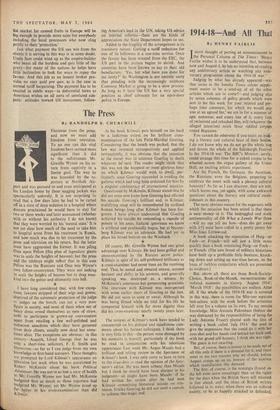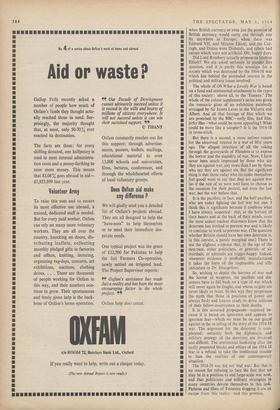1914-18 And All That
By HENRY FAIRLIE IHAVE thought of putting an announcement in the Personal Column of The Times: 'Henry Fairlie wishes it to be understood that, between now and August 4, he has no intention of reading any anniversary article or watching any anni- versary programme about the 1914-18 war.'
Judging by what has already appeared—was that series in the Sunday Times colour supple- ment meant to be a . send-up of all the other articles which are to come?—and judging also by seven columns of galley proofs which were sent to me this week `for your interest and per- haps your comment, for which we would pay you at an agreed fee,' we are in for a summer of epic nonsense; and every line of it, every foot of reclaimed and rehashed film, will (whatever the alleged intention) mock those riddled corpses round Bapaume. Judging by what has already appeared—was that series in the Sunday Times colour supple- ment meant to be a . send-up of all the other articles which are to come?—and judging also by seven columns of galley proofs which were sent to me this week `for your interest and per- haps your comment, for which we would pay you at an agreed fee,' we are in for a summer of epic nonsense; and every line of it, every foot of reclaimed and rehashed film, will (whatever the alleged intention) mock those riddled corpses round Bapaume.
You cannot do otherwise if you insist on mak- ing a literary and cultural feast of their bodies. I do not know why we do not go the whole hog and devote the whole of the Edinburgh Festival to the 1914-18 war. The BBC's Monitor, surely, could arrange this time for a naked corpse to be wheeled .across the organ gallery of the Usher Hall; an exciting artistic experiment.
Are the French, the Germans, the Austrians, the 'Russians, even the Belgians, preparing to celebrate the event with such a phoney cultural bonanza? As far as I can discover, they are not; which leaves one, yet again, with some awkward questions about the literary and cultural estab- lishment in this country.
The most obvious reason for the eagerness with which the occasion has been seized is that there is easy money in it. The bedraggled and stock sentimentality of Oh What a Lovely War (how —will no one tell me how—does she get away with it?) must have rolled in a pretty penny for Miss Joan Littlewood.
A book attacking the reputation of Haig—or Foch--or French—will sell just a little more quickly than a book reinstating Haig—or Foch- or French. (The new breed of military historians have built up a profitable little business, knock- ing down and setting up war-time heroes, on the basis of reckless conjectures which are presented as evidence.) But, above all, there are those Book-Society- Choice, Book-of-the-Month, reconstructions of isolated moments in history. 'August 1914; `March 1918': the possibilities are endless. After all, if the whole of the 1914-18 war is covered in this way, there is room for fifty-one separate best-sellers, with the week before the armistice left over for a volume on its own. To my certain knowledge, Miss Antonia Pakenham (before she was distracted by the responsibilities of being the Lady Antonia Fraser) played with the idea of writing a book called 'July 1914.' She used to give the impression that she could do it with her eyes shut and her hands tied behind her back and, with her grand self-honesty, I think she was right. The genre is not exacting.
But, of course, there is money to be made out of all this only if there is a demand for it, and there seem to me two reasons why we should, before
which ustmcarneoupfascut,upre this demand.dbemewaanrde. of the motives h The first, of course, is the nostalgia (found on the left even more revealingly than on the right) for the days when the British Navy still steamed in line ahead, and the ideas of British writers• followed in its wake; when there was an ordered society, to be as happily attacked as defended; when British currency or even just the promise of British currency would carry one through any fix anywhere in Europe; when there was Edward VII, and Maxine Elliott, and the Cur- ragh, and Dukes were Diehards, and rebels had causes which were not artificial. Oh, happy days.
Did Lord Rosebery actually propose to Maxine Elliott? We are asked seriously to ponder this question, and it is partly this nostalgia for a society which was destroyed by the 1914-18 war which lies behind the pretended interest in the political and military issues involved.
The whole of Oh What a Lovely War is based on a fond and sentimental attachment to the types of this society: above all, to the 'Tommy.' The whole of the colour supplement's series was given the romantic gloss of an exhibition painlessly arranged by Sir James Laver in the Victoria and Albert. And all that footage of film which we are promised by the BBC—early film, bad film, jerky film—what could be more appealing? What could be more like a sampler? It is the 1914-18 in cross-stitch.
But there is a second, a more serious reason for the abnormal interest in a war of fifty years ago. The alleged intention of all the raking through the graveyards of Flanders-is to expose the horror and the stupidity of war. Now, I have never been much impressed by those who say they are against war, any more than I am by those who say they are against sin. But the significant thing is that those today who (to make themselves feel good) want to say that they are against war (as if the rest of us were not) have to choose as the occasion for their protest, not even the last war, but the war before that.
It is the pacifists, in fact, and the half-pacifists, who are today fighting the last war but one. I think this is significant because it confirms what I have always suspected: that, at the bottom of their hearts and at the back of their minds, even the most ardent nuclear disarmers know that the deterrent has worked to prevent war and is likely to continue to work to prevent war. (The question whether Britain should have her own deterrent is, in this context, a purely marginal one.) There is not the slightest evidence that, in the age of the deterrent, either politicians, or generals, or air marshals, or admirals are trigger-happy. Indeed, whenever evidence is profitably manufactured it takes the form of the implausible and silly caricature in Dr. Strangelove.
So, wishing to depict the horrors of war and the horror of weapons, the pacifists and dis- armers have to fall back on a type of war which will never again be fought, and whose origins are never likely to recur. In this way they perpetuate the myth that those in positions of power are always fools and knaves ready to drive millions of their fellow-countrymen to their deaths.
It is this accursed propaganda—acquired be- cause it is based on ignorance and appeals to ignorant fear—which we must be on our guard against in the re-telling of the story of the 1914-18 war. The argument for the deterrent is com- plicated: certainly both the diplomatic and military strategy of the deterrent are involved and difficult. The sentimental hankering after the easily presented blacks and whites of the 1914-18 war is a refusal to take the intellectual trouble to face the realities of our contemporary situation.
The 1914.18 war did not 'end war.' But that is no reason for refusing to face the fact that we may be in a position to end large-scale war now, and that politicians and military strategists in many countries devote themselves to this task. Pictures and films of Tommies slogging it are an escape from this reality- and this promise.















































 Previous page
Previous page